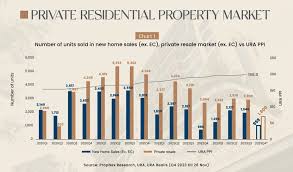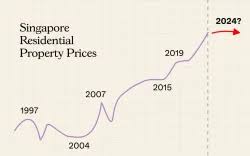
Determining whether your property value has peaked involves analyzing factors influencing real estate market trends.
In this article, we will use the Singapore market as a reference and provide some data for a more in-depth study.
Here’s a step-by-step approach to help you assess if your property value has reached its peak:
1. Market Trends Analysis
Research your area’s current real estate market trends, including supply and demand dynamics. A market with low inventory and high demand might indicate that property values are at or near their peak.
Based on the current insights into the Singapore property market for 2024, here are some key trends and observations:
- Moderation in Demand: The residential property market in Singapore has seen further moderation in the demand for both private and public housing in 2023. This trend suggests a cooling phase in the market dynamics.
- Occupancy and Loan Trends: There’s an observable shift towards landlords and tenants taking advantage of higher occupancy caps, alongside a departure from fixed-interest home loans anticipated in late 2024. These changes indicate adjustments in the market to address and adapt to evolving financial and living conditions.
- Buyer Behavior Shifts: In 2024, buyer behavior in the Singapore property market is undergoing significant shifts, with today’s home buyers becoming more informed and discerning. This evolution highlights the importance of market knowledge and the strategic selection of properties.
- Rental and Price Growth Moderation: Both rental and price growth have moderated in 2023, accompanied by sluggish sales and ample completions. The momentum of growth is expected to ease further into 2024, suggesting a potential plateau or adjustment phase in the market values.
- Incoming Supply Impact: A substantial incoming supply of 59,100 new homes is noted, which could impact the property market dynamics by potentially influencing price adjustments and availability.
- Prime Residential Price Forecast: Singapore is forecasted to see prime residential prices fall in the range of -3.9% and -2% in 2024. Such a projection implies a market correction that could offer opportunities for buyers seeking value investments.
- Investment Market Outlook: Despite the challenges, there’s a silver lining for Singapore’s real estate investment market in 2024. The volume of investment deals is likely to close higher than in 2023, signaling returning activity and confidence in the market as buyers and sellers re-engage.
These trends reflect a complex interplay of factors shaping the Singapore property market in 2024, including economic indicators, buyer behaviors, and supply dynamics. For potential buyers, sellers, and investors, staying informed about these trends can aid in making strategic decisions aligned with market conditions.
2. Compare Recent Sales
Look at recent sales prices of similar properties in your neighborhood. If prices have stabilized or started declining after a period of consistent growth, this could signal a peak.
Here’s a summary of the recent sales data and trends in the Singapore property market for 2023 and 2024 based on the information provided:
2023 Overview
- HDB Resale Market: The HDB resale market saw volumes fall by 6.57% from 26,720 to 24,964, continuing a downward trend observed between 2021 and 2022.
- Private Home Completions: Around 20,400 private homes were completed in 2023, marking the greatest annual supply completion since 2017. An additional 8,959 units are projected to be completed thereafter.
- Private Residential Prices: Despite a sales slowdown, private residential prices rose by 1.5% in the first quarter compared to the previous three months. This increase occurred for the third consecutive quarter, defying the sales downturn.
- Rental Index Increase: The rental index of private all-residential properties rose by 19.29% year-on-year in Q3 2023, marking the seventh consecutive increase.
- Lowest Home Sales Since 2008: New private home sales plunged 83% to 135 units in December, reaching its lowest monthly sales since the global financial crisis.
- 15-Year Low in New Home Sales: New private home sales in 2023 fell to the lowest level in 15 years due to housing curbs and weakening economic conditions.
- Year-End Sales Tally: An estimated 6,452 new homes were sold throughout 2023, approximately 9.1% fewer than the 7,099 sales in 2022, and about half the tally from previous years.
- Rental Market: Overall rents increased by 8.2% year-on-year as of March 2023, with rents in Mature Estates and Non-Mature Estates increasing by 7.5% and 8.9%, respectively.
Looking into 2024
- Market Predictions: While the market showed signs of slowing down in December 2023, with a notable absence of significant new launch projects, 2024 predictions indicate potential shifts and adjustments in response to the prior year’s trends.

These insights suggest a mixed picture of the Singapore property market with certain segments experiencing price growth and increased rental rates, while overall sales activity has seen a significant downturn against a backdrop of increased completions and economic challenges.
It’s important for stakeholders to closely monitor these evolving trends as they continue to shape the property landscape in Singapore.
3. Economic Indicators
Monitor economic indicators such as interest rates, employment rates, and GDP growth. Rising interest rates often cool down the housing market, suggesting a potential peak.
Based on the recent economic indicators for Singapore, here’s an overview of key elements for 2023 and 2024, and their potential impact on the housing market:
- GDP Growth:
- For 2023, data indicates a mixed economic performance with a forecasted expansion in GDP ranging from about 1% to 3% according to the country’s trade and industry ministry.
- In 2024, GDP growth is expected to accelerate, with projections indicating a growth rate of 2.4% as external demand recovers. This aligns with the government’s expectations for GDP growth to be between 1% and 3% for the year.
- Inflation Rates:
- The headline inflation rate for 2024 is forecasted to stand at around 3.1%, showing a slight adjustment from previous expectations.
- Interest Rates:
- The projected inflation rate suggests that monetary policy might lean towards managing inflation expectations, which could influence interest rate adjustments.
- Employment Rates:
- The positive GDP growth rate and the focus on manufacturing suggest potentially stable or improving employment conditions.
Housing Market Analysis:
Given the economic indicators:
- GDP Growth: PositGDP growth GDP both in 2023 and 2024 typically supports housing market activity, suggesting confidence and investment in the economy.
- Inflation and Potential Interest Rate Adjustments: With inflation rates projected at around 3.0% to 3.1% for 2024, there may be an inclination towards slightly higher interest rates to manage inflation. Historically, rising interest rates can cool down real estate markets by increasing borrowing costs, which could dampen buyer enthusiasm.
However, given the growth outlook and moderate inflation expectations, the housing market in Singapore may still be relatively buoyant. The balance between economic growth and any potential increase in interest rates will be key to determining market temperature.
Without explicit data on current interest rates or a significant hike in rates indicated, it’s challenging to label the market as strictly hot or cool.
The Singapore housing market in 2024 seems to be in a stable condition with healthy economic fundamentals supporting it.
A slight cooling might be expected if interest rates rise to curb inflation, but overall market activity likely remains robust, driven by economic growth and sustained demand.
4. Real Estate Cycles
Understand the real estate cycle in your area, which typically moves through phases of expansion, peak, contraction, and trough. Recognizing which phase the market is in can help determine if values have peaked.
Given Singapore’s expected GDP growth rate of around 2.4% in 2024 and the country’s recovery from external economic pressures, there’s an implication of potential expansion.
However, this expansion might be moderated by the government’s measures to ensure sustainable growth in the housing market and prevent overheating.
Analysis for 2024

Considering the economic growth, controlled inflation, and the government’s active role in managing the property market, Singapore’s real estate cycle in 2024 seems to be positioned between the late expansion and early peak phases.
The market appears stable with a slight risk of entering a contraction phase if interest rates rise significantly to combat inflation.
This would potentially cool down the market, but a drastic drop into a trough seems unlikely given the robust fundamentals of Singapore’s economy and the real estate market’s resilience.
It’s important to monitor closely how the interplay of global economic conditions, local government policies, and market sentiment evolves throughout 2024, as these will be crucial in determining the exact phase of the real estate cycle in Singapore.
5. Local Development and Infrastructure
Keep an eye on local development projects and infrastructure improvements. While such projects can boost property values initially, a completion or lack of new developments could mean values have peaked.
There are several ongoing projects and infrastructure developments in Singapore that could potentially impact property values. Here are some key projects:
- Thomson-East Coast Line (TEL) and Cross Island Line (CRL) Expansions: The expansion of these transportation networks is likely to improve connectivity and accessibility, potentially boosting property values in areas with enhanced public transportation access.
- Greater Southern Waterfront Redevelopment: The transformation of the Greater Southern Waterfront area into a vibrant mixed-use district could lead to increased demand for properties in the vicinity, driving up values.
- Paya Lebar Air Base Redevelopment: The redevelopment of Paya Lebar Air Base into a commercial hub is expected to bring new business opportunities and amenities to the area, potentially impacting property values positively.
- Rail System Expansion and Infrastructure Improvements: Ongoing efforts to expand the rail system and enhance commuter infrastructure can lead to improved accessibility and desirability of locations served by these developments, influencing property values.
By keeping track of these projects and infrastructure works, you can stay informed about potential shifts in property values in Singapore and make informed decisions regarding your real estate investments.
6. Expert Consultation
Consult with real estate professionals, including agents and appraisers, who have a deeper insight into local market conditions and can provide a comparative market analysis (CMA).
Here are some reputable real estate professionals in Singapore and their insights for the year 2024:
- PropNex Realty: PropNex Realty is one of the leading real estate agencies in Singapore known for its extensive network of property agents and comprehensive market knowledge. Their agents have been highlighting the impact of new infrastructure projects and evolving market trends on property values in 2024.
- ERA Realty Network: ERA Realty Network is another prominent real estate agency in Singapore with a strong track record in providing expert guidance on property investments and market analysis. Their agents have shared insights on the shifting demand patterns and investment opportunities in the real estate market for the year.
- Knight Frank Singapore: Knight Frank is a globally recognized real estate consultancy that offers professional services in valuation, research, and advisory for the Singapore property market. Their appraisers have been analyzing the impact of economic indicators and development projects on property values in 2024.
- OrangeTee & Tie: OrangeTee & Tie is a well-established real estate agency in Singapore known for its innovative approaches to property marketing and analysis. Their real estate professionals have been providing insights on the residential and commercial property sectors, including forecasts for market trends and pricing.
By consulting with these reputable real estate professionals and agencies, property owners can gain a deeper understanding of the local market conditions, emerging trends, and factors influencing property values in Singapore for the year 2024.
7. Online Valuation Tools
Use online property valuation tools as a reference, but remember these tools provide estimates based on general data and might not account for unique property features or the most current market trends.
When it comes to estimating property values in Singapore, there are several online property valuation tools that you can use to get an initial estimate:
- SRX Property: SRX Property offers an online property valuation tool that provides estimates based on recent transaction data and market trends. Reviewers often praise the tool for its user-friendly interface and relatively accurate valuations, especially for residential properties in Singapore. Source: SRX Property Valuation Tool
- 99.co: 99.co provides a property valuation tool that leverages artificial intelligence to estimate property values. Users appreciate the tool’s comprehensive database and customization options, allowing them to input specific property details for more accurate estimates. However, some reviewers mention variations in estimates compared to actual sale prices. Source: 99.co Valuation Tool
- PropertyGuru: PropertyGuru offers an online valuation tool that gives users a quick estimate of their property’s value based on historical data and market trends. Reviewers find the tool convenient and easy to use, but some note that the estimates may not always align perfectly with current market conditions. Source: PropertyGuru Valuation Tool
- EdgeProp: EdgeProp features a property valuation tool that provides insights into property values and trends in Singapore. Users appreciate the tool’s detailed analysis and market comparisons, offering valuable information for property owners. However, some reviewers mention the need for more frequent updates to reflect real-time market changes. Source: EdgeProp Valuation Tool
By using these online property valuation tools, you can get a rough estimate of their property’s value in Singapore.
It’s important to remember that while these tools can provide a starting point, consulting with real estate professionals for a more accurate Comparative Market Analysis (CMA) is recommended for precise valuation assessments.
8. Rental Yield
If you’re an investor, examine rental yields. Declining yields in a rising market could hint at reaching a peak since rental prices may not keep up with increasing property values.
Based on the rental yield data in the Singapore market, it appears that there are fluctuations in rental yields across different property types. Here is a summary of the rental yield trends based on the information gathered:
- HDB Rental Yields:
- 3-room HDB flats offer an attractive average yield of 7.8%, indicating a relatively high return on investment for this segment.
- The rental prices for 4-room HDB flats in specific areas like Ang Mo Kio have shown a slight increase from Q4 2023 to Q1 2024.
- Overall, HDB rental yields can vary depending on factors such as location, property size, and market demand.
- Industrial Rental Yields:
- Industrial rents have been experiencing moderate growth rates between 0% to 3% in 2024, as forecasted by Savills Research.
- Industrial rental growth rates have remained steady, with industrial rents continuing to rise by 1.7% quarter-on-quarter for the 14th consecutive quarter in Q1 2024, according to Cushman & Wakefield.
- Private Housing Rental Yields:
- Research by Savills Singapore predicts a 5% year-on-year decrease in private residential prices in 2024, potentially impacting rental yields.
- Private housing rents are expected to fall by 5% year-on-year, reflecting a decline in rental yields in this segment.
It’s important to consider these fluctuations in rental yields alongside other market indicators to assess whether property values have peaked.
9. Check for Overexuberance
Be cautious of overexuberance in the market, where prices are driven by speculation rather than fundamentals. This can be a sign of a bubble that’s about to burst, indicating a peak.
As of the current state of the Singapore property market, there are signs of cautious optimism and some concerns regarding potential overexuberance. Here are some key factors contributing to the discussion:
- Price Appreciation: Property prices in certain segments, particularly luxury residential properties and prime locations, have shown significant appreciation over recent quarters, leading to questions about sustainability and potential overheating.
- Government Measures: The Singapore government has implemented cooling measures in the past to prevent speculative bubbles and ensure a stable property market. These measures aim to curb excessive speculation and promote sustainable growth.
- Rental Yields: While rental yields have fluctuated across different property types, there are indications that rental prices may not be keeping pace with property value appreciation, potentially signaling a mismatch and raising concerns about overexuberance.
Considering these factors, property owners, investors, and stakeholders in the Singapore real estate market need to remain vigilant, conduct thorough market research, and consult with real estate professionals to make informed decisions.
In Conclusion
It is crucial to remember that predicting real estate peaks with absolute certainty is challenging due to the multitude of influencing factors and local variations.
Regularly reviewing these aspects and staying informed can help you make a more educated guess about whether your property value has peaked.
